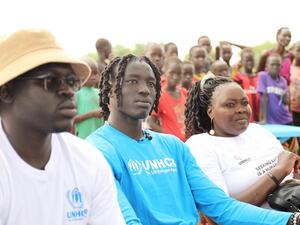New data shows 85,000 more IDPs in Mali than previously known
New data shows 85,000 more IDPs in Mali than previously known

These Malian women fled fighting in the north of the country and found shelter in Sevare town. There are believed to be more than 200,000 internally displaced people in Mali.
GENEVA, November 2 (UNHCR) - The UN refugee agency on Friday said new data from Mali is showing that there are some 85,000 more people displaced within the country's borders than previously estimated.
Spokesman Adrian Edwards told journalists in Geneva that according to the Commission on Population Movement in Mali, a working group under the inter-agency protection cluster lead by UNHCR, at least 203,845 people are displaced. Previously, the estimate was 118,795 internally displaced people (IDP).
"The revised figure reflects in part better access to areas in the north by the Commission, as well as improved counting of IDPs in [the Mali capital Bamako], thanks to work done by IOM [International Organization for Migration]. There the number of displaced people was estimated at 46,000 as of September from 12,000 last June and July," said Edwards.
However, there have also been indications of new displacement, with people reported to be fleeing because of general insecurity and a deteriorating human rights situation in the north of the country, fear of imminent military activity, and because of loss of livelihoods and limited access to basic services.
Edwards said new refugee arrivals were also being seen in neighbouring countries. In Niger there were 3,853 refugees in September and October, while in Burkina Faso last month there were 1,000. For UNHCR and its partners, access to refugees is becoming more difficult in Niger, Burkina Faso and Mauritania.
"The risk of abductions of aid workers means that our teams have to travel with armed escorts. Frequent security alerts are limiting access to the camps and our ability to assist the refugees," Edwards revealed.
In Burkina Faso, UNHCR has started voluntary relocation of Malian refugees from Ferrerio camp and Deou Tamachek site in the northern province of Oudalan, to a safer and improved site further south at Goudebou.
Ferrerio hosts 9,700 refugees and Deou accommodates 2,100 refugees, and so far 400 people have been moved from these sites to Goudebou. A new convoy was scheduled to leave on Friday carrying 200 refugees from Ferrerio. Additional relocation convoys are planned from other sites over the next weeks.
Security is also a concern in Niger. Schools have not started yet in the camps as school classrooms are still being built. UNHCR fears that without schooling, children and adolescents may return to Mali, where there is a risk of recruitment by various armed groups. A lack of funding for recreational and professional activities in the camps means that many refugees are not meaningfully occupied.
To date, UNHCR has received 41.7 per cent of the US$153.7 million needed to assist the Malian refugees and IDPs.








